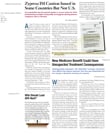Rep. Jim Ramstad (R-Minn.), now serving his eighth term in Congress, knows firsthand that alcoholism is a treatable disease. He has been a recovering alcoholic for the past 23 years. He attributes much of his progress to the treatment he received and has made insurance parity for substance abuse treatment a legislative priority.
Last month Ramstad introduced the Time for Recovery and Equal Access to Treatment in America (TREAT America) Act of 2005 in the House of Representatives to increase access to substance abuse and chemical-dependency treatment. He has been attempting to get a similar bill passed in Congress since 1997, when he introduced the first substance abuse parity bill. Last year, some progress was made on the legislation, with 62 representatives signing on as co-sponsors, according to Ramstad's staff assistant.
No Senate companion bill had been introduced by late March.
Ramstad's bill, which APA supports, would prohibit private health insurers and plans that provide medical, surgical, and substance abuse treatment benefits from imposing financial requirements and treatment limits solely on the coverage for substance abuse treatment unless similar limitations or requirements are imposed for medical and surgical benefits. If the bill becomes law, the prohibition would begin on January 1, 2006.
The legislation defines “financial requirements” as any cost-sharing arrangements including copayments, coinsurance, and deductibles or any annual or lifetime dollar limits.
“We defined treatment limitations as restrictions on the frequency of treatment, number of visits or days of coverage, or other similar limits on the duration or scope of treatment under the health plan or coverage,” Karin Hope, Ramstad's health legislative aide told Psychiatric News.
In a letter last month inviting colleagues to co-sponsor his bill, Ramstad wrote: “Almost 50 years after the AMA declared that addiction to drugs and alcohol is a disease, insurance companies are still allowed to openly discriminate against alcoholics and drug addicts who need treatment.”
Treatment Reduces Costs
Several studies have shown that substance abuse treatment benefits would save money in the long run. An estimated 23 million Americans suffer from substance abuse or addiction, and untreated addiction costs the United States an estimated $400 billion annually, according to the 2001 report“ Substance Abuse: The Nation's Number One Health Problem” by Brandeis University's Schneider Institute for Health Policy.
Treatment reduces drug use by 40 percent to 60 percent, and one year of methadone treatment costs on average $4,700 per patient; in contrast, one year of imprisonment costs $18,400 on average, according to the National Institute on Drug Abuse's 1999 publication “Principles of Drug Addiction Treatment.”
Minimal Cost Increase Predicted
Contrary to the argument espoused by opponents of parity, the cost of implementing substance abuse parity would not increase health insurance premiums significantly. The actuarial firm of Milliman and Robertson Inc. estimated the increase to health insurance premiums to be just 0.5 percent, according to the firm's 1997 report “Premium Estimates for Substance Abuse Parity Provisions for Commercial Health Insurance Products.”
That estimate is in line with that of the Congressional Budget Office to implement parity for mental health treatment.
Ramstad is also the principal co-sponsor of the Paul Wellstone Mental Health Equitable Treatment Act of 2005 (MHETA), which Rep. Patrick Kennedy (D-R.I.) introduced last month in the House. Similar comprehensive parity bills have been introduced in the House each year since 2001 to expand on the 1996 mental health parity law. The 1996 law expired in 2001 but has been extended each year since then; it is now scheduled to expire on December 31. The law requires health insurers and health plans to establish parity in annual and lifetime limits on mental health benefits.
The MHETA would prohibit private health insurers and plans that provide medical, surgical, and mental health treatment benefits from applying financial requirements and treatment limits only on mental health treatment benefits. If the bill becomes law, the mental health care parity mandate would begin January 1, 2006.
The legislation states that mental health benefits are services “as defined under the terms and conditions of the plan or coverage for all categories of mental health conditions listed in the DSM-IV-TR, or the most recent edition if different, if such services are included as part of an authorized treatment plan... and such services meet the plan or issuer's medical necessity criteria.”
That provision is controversial because parity opponents complain that the scope of DSM-IV-TR is virtually unlimited and using it as the standard would drive up health insurance costs.
Proponents of the MHETA counter that argument by pointing to a provision that allows utilization management practices to be instituted to control costs. These practices include utilization review, preauthorization, and the application of medical-necessity criteria, according to the legislation.
Both the MHETA and the TREAT America Act would waive the parity requirement for small businesses with two to 50 employees and if health insurance premiums increased more than 1 percent annually.
The federal legislation would not preempt provisions in state parity laws that provide greater protections.
The parity bills are likely to face opposition in the House again this year. Republican leaders have repeatedly argued, despite evidence to the contrary, that parity will increase insurance premiums and taxes.
Ramstad and Kennedy are the co-chairs of the bipartisan Addiction, Treatment, and Recovery Caucus, which they formed last year to educate their congressional colleagues about substance abuse issues (see
page 13).
Ramstad hopes that educational briefings sponsored by the caucus will underscore the importance of parity in substance abuse treatment, according to Ramstad's office.
The Paul Wellstone MHETA of 2005 (HR 1402) and TREAT America Act of 2005 (HR 1258) can be accessed online at<thomas.loc.gov> by searching on the respective bill's name or number. ▪

